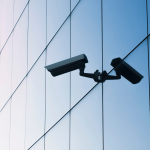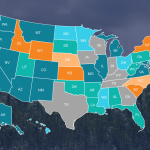A new law will soon require cannabis business owners take a fresh look at their video surveillance system to determine regulatory compliance. Passed in November, the Secure Equipment Act of 2021 takes aim overseas communications equipment manufacturers and their threat to national security. Under the new law, the importation, marketing, and sale of specified Chinese communications products would effectively be banned in the United States. While there are no immediate implications, it is important to understand the law’s future and possibly retroactive effects on cannabis businesses.
Secure Equipment Act
The Secure Equipment Act of 2021 effectively requires the Federal Communications Commission (FCC) to implement rules prohibiting the review and approval of equipment authorizations from its “Covered List”. The Covered List includes telecommunication equipment and services that the FCC determined to pose a risk to national security. In short, the law seeks to prevent China from gaining access to America’s telecommunications network by limiting the sale of specific devices manufactured by Chinese government backed firms.
First introduced in the U.S. House of Representatives in June of 2021, the Secure Equipment Act received bipartisan support. On October 20, 2021, the bill was passed in the House and was unanimously passed in the Senate just eight days later. After swift passage through Congress, President Joe Biden signed the Secure Equipment Act of 2021 into law on November 11, 2021.
The immediate effects of the law have yet to be seen, as the passage of the Secure Equipment Act requires the FCC to publish a final rule by November 11, 2022. Until then, U.S. consumers should be aware of the manufacturers and products identified on the Covered List. It is currently unknown how the FCC ruling will impact both supply chains and existing equipment installs.
What Would be Banned
The Covered List outlines Chinese manufacturers of telecom and video surveillance equipment and services, “deemed to pose an unacceptable risk to the national security of the United States.” Current manufacturers on the Covered List include Huawei Technologies, ZTE Corporation, Hytera Communications Corporation, Hangzhou Hikvision Digital Technology Company, and Dahua Technology Company.
Chinese video surveillance cameras have long been favored as a more economical alternative in the competitive security camera market, and Hikvision and Dahua security cameras have become extremely popular in the U.S. market. So much so, that the technology from these Original Equipment Manufacturers (OEMs) is used and relabeled for sale by over many other manufacturers. Camera equipment owners will be responsible for understanding the original manufacturer of the camera equipment and if they violate the Secure Equipment Act. It is important to note that not all Chinese camera manufacturers are included on the Covered List and therefore not affected by the Secure Equipment Act.
Impact on Cannabis
Moving forward, it is the responsibility of every cannabis business owner to ensure compliance with the Secure Equipment Act of 2021. Depending on the final FCC ruling, cannabis businesses that currently employ video surveillance technology found on the Covered List could be responsible for entire system replacement. Luckily, there are other low-cost, effective video surveillance options on the market that are unaffected by the Secure Equipment Act. Rival manufacturers, such as Hanwha, Vivotek, Bosch, Avigilon, and Axis have begun efforts to capitalize on the market share of commodity grade equipment previously held by these now-banned companies.
Replacing all cameras in a cannabis business would have significant organizational and financial implications for cannabis business owners. In order to remain compliant with local and state regulations, cannabis business owners may need to provide alternative security measures while the cameras are replaced, such as additional security guards or temporarily closing the facility while the surveillance system is offline. Cannabis business owners may also be mandated to store cash and cannabis offsite during the repair or replacement of the system.
Additionally, cannabis business owners may be required to notify a regulatory authority of the change in equipment and ensure that regulatory authorities and local law enforcement have access to the video surveillance feed. While inconvenient, compliance with the Secure Equipment Act of 2021 is in the best interest of all U.S. cannabis businesses as it ultimately relates to national security.
“If your existing equipment is currently on the banned list, as devices reach their ‘end of life’ or need to be replaced, you will be required to source devices from other manufacturers,” said Haley Glover, Senior Security Consultant at Sapphire Risk Advisory Group. “When using various manufacturers, issues can begin to occur with your recording device or software platform and ultimately demand an entirely new system.”
How Can Sapphire Risk Help?
Tony Gallo and the team of application writers and consultants at Sapphire Risk Advisory Group have designed hundreds of video surveillance systems and are familiar with advanced and compliant cameras in the cannabis industry. Follow us on social media to stay up to date with more security best practices and cannabis industry updates!
- California Senate Bill 69 Adds CEQA Requirements for New Cultivators

- Top 5 Cannabis Security and Surveillance Violations

- Peace of Mind in the Retail Sector: Facility Security

- Opportunities in the Ohio (O-High-O) Cannabis Market

- Building Security and Trust: Verifying Identification and Payments

- The Importance of Loss Prevention

- Thoughts to Improve Cannabis Security Regulations Across the Nation

- Opportunities in the Minnesota Cannabis Market

- U.S. Cannabis Legalization 2023 Update

- How to Present Your Cannabis Business Vision to Your City


